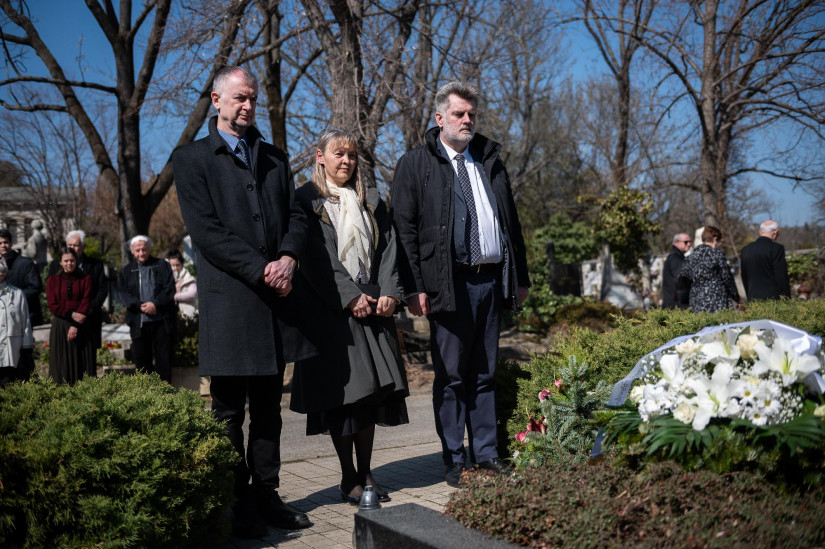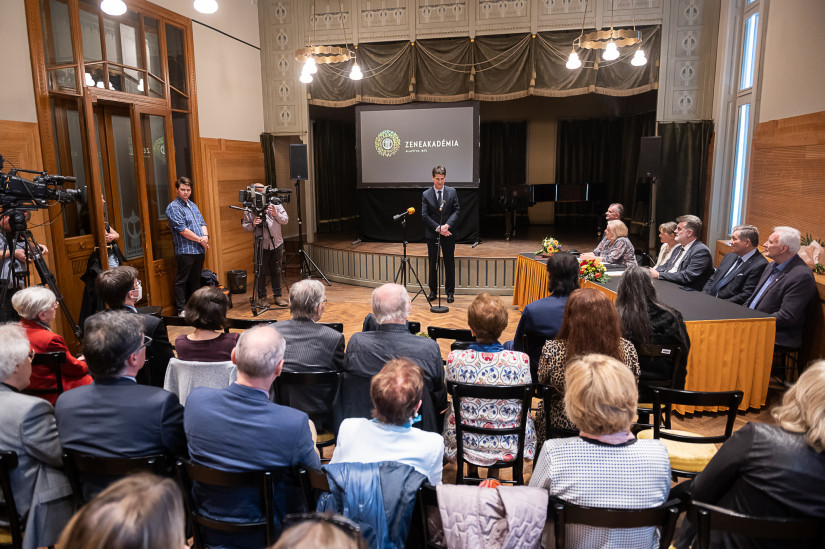Péter Fried and András Gábor Virágh awarded the 2022 Bartók–Pásztory Prize
In line with a well-established tradition, the leadership of the Liszt Academy laid a wreath on the tomb of Béla Bartók on March 25, and the board of trustees of the Bartók–Pásztory Prize presented this year's awards, which were bestowed on opera singer Péter Fried and composer-organist András Gábor Virágh.
Every year on the birth anniversary of Béla Bartók, members of the Liszt Academy lay flowers of remembrance on the tomb of the composer-pianist in the Farkasréti cemetery. On the same day, the institution unveils the names of the two artists awarded with the Bartók–Pásztory Prize – traditionally an instrumental musician and a composer.

Photo: Liszt Academy/Dénes Erdős
The prize was established in the will of the widow of the pianist-composer, Ditta Pásztory and the board of trustees, consisting of the university's director and lecturers, selects the winners on the basis of the will. Every year since 1984, the prize has been awarded to a Hungarian-speaking performer as well as a composer in recognition of outstanding activities, a significant contribution to the development of Hungarian music life and the preservation of Bartók's spiritual legacy.

Photo: Liszt Academy/Dénes Erdős
The board of trustees deciding on the honors is chaired by the director of the Liszt Academy, currently Dr. Andrea Vigh, a Liszt and Prima Award-winning harpist and meritorius artist. The members of the board are lecturers of the institution, currently: Gyula Fekete, Erkel and Bartók–Pásztory Prize-winning composer, head of department, deputy director responsible for international and scientific affairs; conductor Dr. Csaba Kutnyánszky, head of department, Vice-President of Research and International Affairs; Csaba Onczay, Kossuth Prize-winning cellist, professor emeritus; Ádám Medveczky, Kossuth Prize-winning conductor, honorary professor; Gusztáv Hőna, Liszt Prize-winning trombonist, professor emeritus; and Kálmán Dráfi, Liszt Prize-winning pianist and university professor.
Bartók is a compass for all musicians and music lovers, remarked Dr. Andrea Vigh at the awards ceremony. Bartók’s universal legacy, which must be nurtured, is a standard and a firm handhold, she added. Recalling the 39-year history of the award, she said that everyone who had received the prize had truly deserved it, not only for their activities leading up to the reward but also for their performance ever since.

Photo: Liszt Academy/Dénes Erdős
In his laudation about Péter Fried, Ádám Medveczky remarked that as one of the leading bassists of the Opera House, the internationally-renowned singer had significantly contributed to the promotion of Hungarian culture abroad as well. “I witnessed the development of his career almost from the beginning as he was one of my students at the Liszt Academy. His reliability as a person and his attitude towards art deserved the highest praise even then,” Medveczky added. When characterizing Fried’s talent, Medveczky remarked that his vocal character is strong and distinguished by a diversity of expression; he is a “performing artist” with a wide repertoire, who always attracts attention to himself with his performances. “Bluebeard’s Castle occupies a remarkable place in the art of Péter Fried. He is one of the bassists who has received the most requests for the title role from all over the world. The record, featuring him and conductor Pierre Boulez, was nominated for a Grammy Award,” stressed Ádám Medveczky.
Gyula Fekete wrote the laudation about András Gábor Virágh, in which he recalled: the awardee is the youngest member of the organist Virágh dynasty; his first teachers were his grandfather, Endre Virágh, and his father, András Virágh, and his first composition teacher was also an organist, István Koloss. “His music is deeply rooted in Hungarian tradition. In what János Koessler, also an organist, brought to Budapest from Germany at the invitation of Ferenc Liszt. He possesses the brilliant composition technique taught by Koessler to both Bartók and Kodály; thus Hungarian tradition is passed on,” stressed Gyula Fekete. He also cited an interview in which Gábor András Virágh stated that individual style was not enough, he wanted his oeuvre to be worthy to be included in a repertoire so as not to exist only “in a reserve or a laboratory.”
CAREERS:
Péter Fried was born in 1960. He received his degree as an opera singer from the Liszt Academy in 1987, and since 1989, he has been a leading member of the Hungarian State Opera House, an internationally renowned opera, oratorio and concert singer. He is a lecturer at the Liszt Academy. His repertoire includes the title role in Bartók’s Bluebeard Castle, Sarastro (Mozart: The Magic Flute), Osmin (Mozart: Escape from the Seraglio), Don Basilio (Rossini: The Barber of Seville), Alidoro (Rossini: Cinderella), Colline (Puccini: La Boheme), Timur (Puccini: Turandot), Philip II of Spain (Giuseppe Verdi: Don Carlos), Banquo (Verdi: Macbeth), Ramphis (Verdi: Aida), Sparafucile (Verdi: Rigoletto), Count Hermann of Thuringia (Wagner: Tannhäuser), King Henry I (Wagner: Lohengrin) and King Marke (Wagner: Tristan and Isolde). In addition, he starred in the premiere of numerous 20th century and contemporary Hungarian musical works. His performance as Soljonij in the premiere of Péter Eötvös' opera Three Sisters at the Lyon Opera was a significant success. He has had guest performances around the world, in several countries in Europe, the United States and Japan. He has performed the title role of Bluebeard's Castle more than a hundred times abroad. In Toronto and Montreal, where the opera was directed by the world-famous Robert Lepage and at the Lyon Opera, where it was directed by the acclaimed French director Laurent Pelly. The 2006 performance of the same opera – broadcast by Radio France and staged at the Châtelet Opera in Paris, conducted by Pierre Boulez and where his partner was Jessye Norman, – won the title of “Best Classical Music Concert of the Year”. In 2008, at the opening night of the new Oslo Opera House, he played the title role under the direction of Jukka-Pekka Saraste and the performance was broadcast live internationally. He was also awarded the Liszt Prize for his work, among other recognitions.
András Gábor Virágh was born in 1984. He was admitted to the Béla Bartók Conservatory in 1999, where his organ teacher was Zsuzsa Elekes and his composition teacher was István Fekete Győr. In the 2003-2004 academic year, he studied organ at the Vienna Academy of Music with Peter Planyavsky, then organist at the Vienna Stephansdom. From 2004 to 2009, he was an organ student at the Conservatory of the University of Debrecen, under Dr. Dezső Karasszon; he obtained his teacher's diploma with honors. In 2005, he was admitted to the composition department of the Liszt Ferenc University of Music in Budapest, where he obtained a degree and then a doctorate, and is currently a lecturer at the institution. Since 2010, he has also been the organist of St. Stephen's Basilica in Budapest, and has taken the stage as a performer and composer in many countries around the world. In 2011, he was awarded the Junior Prima Award, in 2013 he received the composer award of the Hungarian Academy of Arts, and in 2017 he received the Erkel Award. His work entitled Metamorphosis for 14 Players – composed at the request of the Warsaw Autumn Festival of Contemporary Music in 2017 – was broadcast more than 50 times in 2018 alone by France Musique Radio. In 2020, his piece entitled Gregorian notes, written for viola and organ, received the Classical Music Piece of the Year Award. Among his outstanding achievements in 2020 was the reworking of the comedy opera Violin Competition and Ede Poldini's Wedding in Carnival Time, done at the request of the Hungarian State Opera House. Poldini’s opera premiered at the Eiffel Art Studios in mid-February this year.


